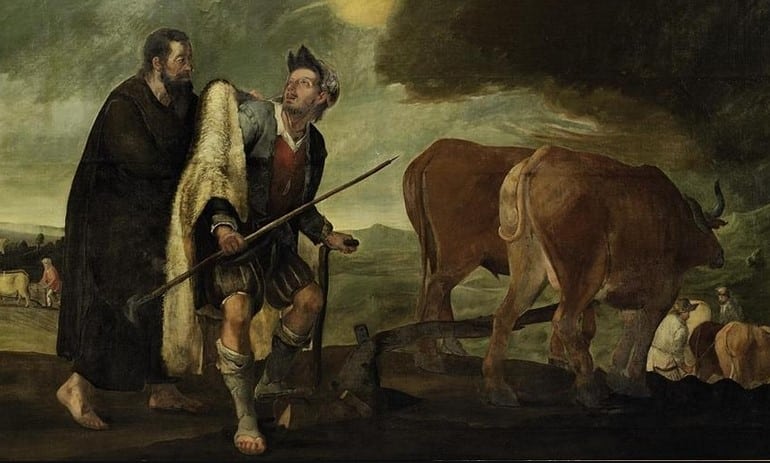Never underestimate the power of a question. A question can turn the course of conversation from jovial banter to probing possibilities. A question, by definition, is “an interrogative expression often used to test knowledge.” Writer Ralph B. Smith once made an observation that children ask roughly 125 questions per day and adults ask about six questions per day, so somewhere between childhood and adulthood, we’ve lost 119 questions per day. Somewhere along the line, adults have lost their curiosity about life.
Every child has a treasure trove of questions that need to be answered. This is how learning begins on a rudimentary level. My four-year-old daughter is a case in point. On occasion, after a discussion about rabbits, paw patrol or bible characters, it’s not uncommon for her to quizzically ask, “why’s that daddy?” We all know, some answers run the risk of a successive, ‘why?’ Any discourse with children can end in a spiral of ‘why’s’ but we should always do our best to help them learn. Questioning is the foundation of learning and was commonly used by Rabbi’s when disciplining the next generation.
A question demands a response
A question requires a response; for every action there is an equal and opposite reaction. One single question has the potential to transform a person’s life. A question can provide the ‘a-ha’ moment that one has long been searching for and propel them into their destiny. Never has a greater question been asked than, “Whom do men say that I am?” (Mk 8:27). In fact, Jesus asks all of us, this very same question and our eternal destiny hinges upon the right response. As Josh McDowell put it, either Jesus is either a lunatic, a liar, or your Lord? It’s up to you to weigh the evidence and come to your own conclusion.
Forms of questioning
There are many forms of questioning. The halls of academia, often utilize the Socratic method of teaching. Socrates, philosophized by inviting students to state a thesis. This proposition was then maintained by argument. Plato was the first to introduce this method, although Socrates’s line of questioning, led to a point of contradiction, in order to either prove or disprove the thesis in question. Socrates would thus utilize either ‘open’ or ‘closed’ ended questioning to probe the student, either validating or rejecting their thesis. This sounds similar to the narrative within the Gospels where Christ would openly refute the claims of religious hypocrites in view of large audiences by asking probing questions. This retort to a point of resolution, was in parlance with Rabbinical tradition, which Christ adhered to. Being on the end of this form of questioning was no doubt intimidating.

The bond between Rabbi and Disciple
When Jesus walked the earth, He was a Rabbi, to His disciples. Although in Jesus day, ‘Rabbi’ was a term of respect for a teacher, it wasn’t until after 70, AD the title became official. The term Rabbi, literally means, ‘my master.’ Today, some people aspire to wealth or fame, but the greatest achievement for the Jewish people was to ‘know the scriptures.’ For this reason, Rabbis were held in high esteem and were the ‘rock stars’ of their day. A disciple would stick closely to his Rabbi, becoming his shadow. Consider when Elisha, was offered his prophetic apprenticeship by Elijah, he didn’t even return home to say goodbye to his family. He knew Elijah’s offer was so rare, it might not come a second time (1 Kgs 19:21). Such was the honor of being offered a discipleship from the ‘man of God.’

It was commonplace for the Rabbi to start quoting a scripture out loud and let the disciple finish the rest of the passage. The master would then ask questions about how the law would be applied in everyday life. The task of the disciple was literally to become the master. This premise has not changed, as we are to become like Christ, being conformed to His image and likeness. Jesus knew the scriptures, He spent hours as a child pouring over them. He quoted from the book of Deuteronomy more often than any other book of the Torah (or law). Jesus loved God’s word and so should we.
Much has been lost in today’s society. The interaction between Rabbi and disciple, builds a strong lasting bond, between master and pupil. In like manner, we must never forget that we are disciples of Christ, clipping at His heels, ever watchful of His next step, attentive to His needs and mindful of His heart’s concern. As we interact with Him, the bond becomes stronger also. We too must become keen disciples and a shadow of the master.

Types of questioning defined – Open vs Closed
Whilst compiling my Master’s thesis, I decided to categorize all the questions Jesus asked within the Gospel narrative. For the most part, He asked questions that were challenging, testing or probing. His style of questioning fell into two basic categories, either ‘closed-ended’ or ‘open-ended.’ He was also on the receiving end of some cross-examinations from Pharisees, Scribes and Lawyers, designed to trap him. In all, I counted 100 questions that Christ asked and allow me categorize them for you.
A closed-ended question encourages a short or single word answer, i.e., ‘yes’ or ‘no.’ They’re often subjective, and the responses are limited or tied closely to the question asked. A closed ended question seeks a definitive response.
An open-ended question encourages a full, meaningful answer using the subject’s own knowledge, experience or emotions. Open ended questions tend to be objective and less leading; they give the person the greatest amount of latitude and freedom to respond.
What’s particularly interesting is Jesus didn’t always answer the question posed to Him, but sometimes retorted with another question. This was a technique often used by Rabbi’s when conversing with their disciples. It causes the listener to think deeply before responding. Jesus often probed His audience, challenging them to think on spiritual things, using analogies they could relate to, in the form of parables. People went about earning a living, feeding their family, paying taxes etc., with very little time for entertainment, unlike today. How did Jesus get these busy people to consider spiritual matters? By asking influential questions and using analogies they could relate to. The parables were his vehicle for achieving this.

Christ would often describe practical, everyday tasks that people were familiar with, like bearing fruit, building projects, wine or olive pressing, farming, threshing, wine-skin repair etc. then introduce spiritual concepts in the form of open or closed ended questions. But what was the common thread of Christ’s questioning technique? He wanted people to think on eternal matters as well as everyday life.
Jesus was often moved with compassion and motivated by it. He was accepting of people but not necessarily their behavior. He was nurturing and corrective. Jesus lived in a hurting world; nothing much has changed. Open and closed ended questioning techniques are a tool we can exploit to identify problem areas for hurting people, which may open a door to minister to them. Christ employed these techniques when he ministered on earth.
7 examples of Open-ended questions
If you want to know more about someone, open ended is the way to go. Open ended questions are often visceral, inviting the exchange of emotions and/or experiences. However, a series of open-ended questions can spark frustration, as this technique can quickly lead to other branches of discussion without gaining a satisfactory answer to the original question. Open ended; gives conversational control to the recipient of the question but not the questioner:
- Tell me about yourself?
- Why did you choose this?
- What qualities are you looking for in a husband?
- What does Jesus mean to you?
- How do you feel about politics?
- What challenges are you facing at the moment?
- Describe the worst thing that’s ever happened to you?
7 examples of Closed-ended questions
Closed ended questions often (but not always) follow open ended questions, seeking to funnel the conversation to a pointed end. The questioner has more control of the dialogue using this style, often reaching definitive answers about the persons preferences or beliefs. Awkward pauses in conversation are more likely to occur with closed ended questions:
- Are you feeling better today?
- Is that your final answer?
- May I use the bathroom?
- Are you an easy-going person?
- Where will you go when you die?
- Do you believe in heaven?
- Do you believe in hell?
Here’s your challenge
As a believer we have opportunities every day, to ask probing questions which can trigger an individual to switch their perspective from natural, to spiritual matters. However, be warned, a measure of trust must be built with the person before asking intimate questions that have the potential to cause offense. Ask God for timely opportunities to politely question your family, friends and colleagues, awakening them from their spiritual blindness.
We can employ ‘open’ or ‘closed’ ended questions to make people more aware of their decrepit spiritual condition, which only Christ can resolve. God’s word is the primary tool we have to do this. It transcends all generations, demographics and localities.

100 questions that Jesus asked – Open ended vs Closed ended
I identified 100 questions that Jesus asked and categorized them into either open or closed ended (these are listed below). You will notice the majority are open (63%), whilst the remaining (37%) are closed. A cursory review of Christ’s questioning techniques, proves the majority of the time He used open-ended questioning, seeking to identify hurts, change perspectives or dissipate unbelief in the recipient.
We should consider His techniques, the next time we have a good old chinwag, around the coffee table. If you think you know someone well after many years, I challenge to you ask them an open-ended question. They might end up talking for 10 minutes straight! Open-ended questions are most often used in date settings or job interviews. Here is the complete list of questions that Jesus asked:
- ‘And if you greet your brethren only, what is unusual about that?’ – open, ‘Do not the unbelievers do the same?’ (Matt 5:47) – closed
- ‘Can any of you by worrying add a single moment to your lifespan?’ (Matt 6:27) – closed
- ‘Why are you anxious about clothes?’ (Matt 6:28) – open
- ‘Why do you notice the splinter in your brother’s eye yet fail to perceive the wooden beam in your own eye?’ (Matt 7:2) – open
- ‘Do people pick grapes from thorn bushes or figs from thistles?’ (Matt 7:16) – closed
- ‘Why are you terrified?’ (Matt 8:26) – open
- ‘Why do you harbor evil thoughts?’ (Matt 9:4) – open
- ‘Can the wedding guests mourn so long as the bridegroom is with them?’ (Matt 9:15) – closed
- ‘Do you believe I can do this?’ (Matt 9:28) – closed
- ‘What did you go out to the desert to see?’ (Matt 11:8) – open
- ‘To what shall I compare this generation?’ (Matt 11:6) – open
- ‘Which of you who has a sheep that falls into a pit on the Sabbath will not take hold of it and lift it out?’ (Matt 12:11) – open
- ‘How can anyone enter a strong man’s house and take hold of his possessions unless he first ties up the strong man?’ (Matt 12:29) – open
- ‘You brood of vipers! How can you say good things when you are evil?’ (Matt 12:34) – open
- ‘Who is my mother? Who are my brothers?’ (Matt 12:48) – open
- ‘Why did you doubt?’ (Matt 14:31) – open
- ‘And why do you break the commandments of God for the sake of your tradition?’ (Matt 15:3) – open
- ‘How many loaves do you have?’ (Matt 15:34) – closed
- ‘Do you not yet understand?’ (Matt 16:8) – closed
- ‘Who do people say the Son of Man is?’ (Matt 16:13) – open
- ‘But who do you say that I am?’ (Matt 16:15) – open
- ‘What profit would there be for one to gain the whole world and forfeit his life and what can one give in exchange for his life?’ (Matt 16:26) – open
- ‘O faithless and perverse generation how long must I endure you?’ (Matt 17:17) – open
- ‘Why do you ask me about what is good?’ (Matt 19:16) – open
- ‘Can you drink the cup that I am going to drink?’ (Matt 20:22) – closed
- ‘What do you want me to do for you?’ (Matt 20:32) – open
- ‘Did you never read the scriptures?’ (Matt 21:42) – closed
- ‘Why are you testing me?’ (Matt 22:18) – open
- ‘Blind fools, which is greater, the gold or the temple that makes the gold sacred, the gift of the altar that makes the gift sacred?’ (Matt 23:17-19) – closed
- ‘How are you to avoid being sentenced to hell?’ (Matt 23:33) – open
- ‘Why do you make trouble for the woman?’ (Matt 26:10) – open
- ‘Could you not watch for me one brief hour?’ (Matt 26:40) – closed
- ‘Do you think I cannot call upon my father and he will not provide me at this moment with more than 12 legions of angels?’ (Matt 26:53) – open
- Have you come out as against a robber with swords and clubs to seize me? (Matt 26:53) – closed
- My God, My God, why have you forsaken me? (Matt 27:46) – open
- Why are you thinking such things in your heart? (Mark 2:8) – open
- Is a lamp brought to be put under a basket or under a bed rather than on a lamp stand? (Mark 4:21) – closed
- Who has touched my clothes? (Mark 5:30) – closed
- Why this commotion and weeping? (Mark 5:39) – open
- Are even you likewise without understanding? (Mark 7:18) – open
- Why does this generation seek a sign? (Mark 8:12) – open
- Do you not yet understand or comprehend? Are your hearts hardened? Do you have eyes and still not see? Ears and not hear? (Mark 8:17-18) – open
- How many wicker baskets full of leftover fragments did you pick up? (Mark 8:19) – closed
- [To the Blind man] Do you see anything? (Mark 8:23) – closed
- What were you arguing about on the way? (Mark 9:33) – open
- Salt is good, but what if salt becomes flat? (Mark 9:50) – open
- What did Moses command you? (Mark 10:3) – open
- Do you see these great buildings? They will all be thrown down. (Mark 13:2) – closed
- Simon, are you asleep? (Mark 14:37) – closed
- Why were you looking for me? (Luke 2:49) – open
- What are you thinking in your hearts? (Luke 5:22) – open
- Why do you call me ‘Lord, Lord’ and not do what I command? (Luke 6:46) – open
- Where is your faith? (Luke 8:25) – open
- What is your name? (Luke 8:30) – closed
- Who touched me? (Luke 8:45) – closed
- Will you be exalted to heaven? (Luke 10:15) – open
- What is written in the law? How do you read it? (Luke 10:26) – open
- Which of these three in your opinion was neighbor to the robber’s victim? (Luke 10:36) – closed
- Did not the maker of the outside also make the inside? (Luke 11:40) – closed
- Friend, who appointed me as your judge and arbiter? (Luke 12:14) – open
- If even the smallest things are beyond your control, why are you anxious about the rest? (Luke 12:26) – open
- Why do you not judge for yourself what is right? (Luke 12:57) – open
- What king, marching into battle would not first sit down and decide whether with ten thousand troops he can successfully oppose another king marching upon him with twenty thousand troops? (Luke 14:31) – open
- If therefore you are not trustworthy with worldly wealth, who will trust you with true – wealth? (Luke 16:11) – open
- Has none but this foreigner returned to give thanks to God? (Luke 17:18) – closed
- Will not God then secure the rights of his chosen ones who call out to him day and night? (Luke 18:7) – open
- But when the Son of Man comes, will he find any faith on earth? (Luke 18:8) – closed
- For who is greater, the one seated a table or the one who serves? (Luke 22:27) – closed
- Why are you sleeping? (Luke 22:46) – open
- For if these things are done when the wood is green, what will happen when it is dry? (Luke 23:31) – open
- What are you discussing as you walk along? (Luke 24:17) – open
- Was it not necessary that the Messiah should suffer these things and then enter his glory? (Luke 24:26) – closed
- Have you anything here to eat? (Luke 24:41) – closed
- What are you looking for? (John 1:38) – open
- How does this concern of yours affect me? (John 2:4) – open
- You are a teacher in Israel and you do not understand this? (John 3: 10) – closed
- If I tell you about earthly things and you will not believe, how will you believe when I tell you of heavenly things? (John 3: 12) – open
- Do you want to be well? (John 5:6) – closed
- How is it that you seek praise from one another and not seek the praise that comes from God? (John 5:44) – open
- If you do not believe Moses’ writings, how will you believe me? (John 5:47) – open
- Where can we buy enough food for them to eat? (John 6:5) – open
- Does this shock you? (John 6:61) – closed
- Do you also want to leave me? (John 6:67) – closed
- Why are you trying to kill me? (John 7:19) – open
- Woman where are they, has no one condemned you? (John 8:10) – open
- Why do you not understand what I am saying? (John 8:43) – open
- Can any of you charge me with sin? (John 8:46) – closed
- If I am telling you the truth, why do you not believe me? (John 8:46) – open
- Are there not twelve hours in a day? (John 11:9) – closed
- Do you believe this? (John 11:26) – closed
- Do you realize what I have done for you? (John 13:12) – open
- Have I been with you for so long and still you do not know me? (John 14:9) – open
- Whom are you looking for? (John 18:4) – closed
- Shall I not drink the cup the father gave me? (John 18:11) – closed
- If I have spoken rightly, why did you strike me? (John 18:23) – open
- Do you say [what you say about me] on your own or have others been telling you about me? (John 18:34) – open
- Have you come to believe because you have seen me? – closed (John 20:29)
- Do you love me? (John 21:16) – closed
- What if I want John to remain until I come? (John 21:22) – open
- What concern is it of yours? (John 21:22) – open
Author – Carl G.M. Joseph
Have you believed on the Lord Jesus Christ? If not, click here to find out more…
Bibliography:
https://www.merriam-webster.com/dictionary/question
https://www.preachingtoday.com/illustrations/2015/november/6111615.html
Encyclopedia Britannica Ultimate Reference Suite (Socrates)
H. Norman Wright, The Complete Guide to Crisis & Trauma Counseling: What to Do and Say When It Matters Most! (Ventura, CA: Regal, 2011), 40.
Sitting at the feet of Rabbi Jesus – ‘How the Jewishness of Jesus can transform your faith’ – Spangler and “Tverberg (Zondervan Publishing, 2009).
“To Investigate life coaching and the distinct advantages of the Christian coaching model in comparison to the secular model” By Carl G.M. Joseph – Appendix D (Mmin Thesis (MAP), May 2012).
Title: Jesus: The master of influential questioning
Related keyword searches:





